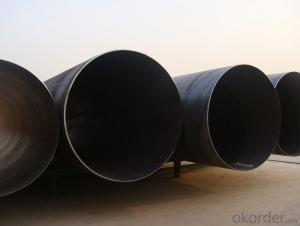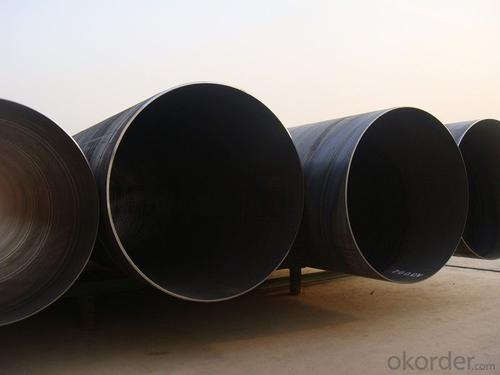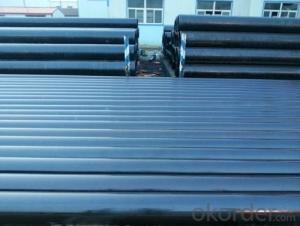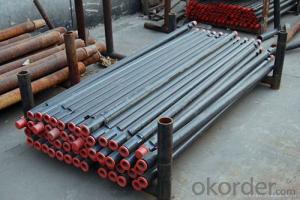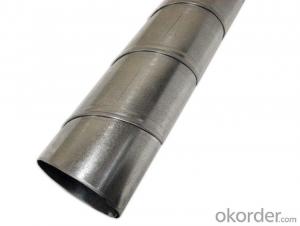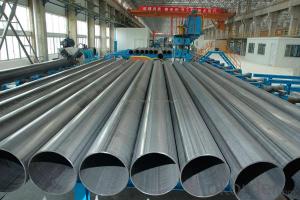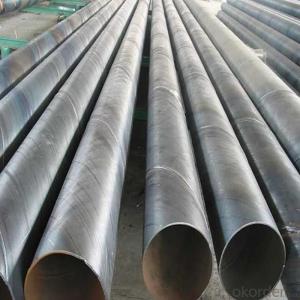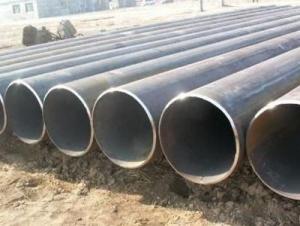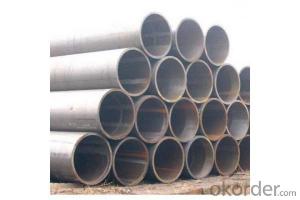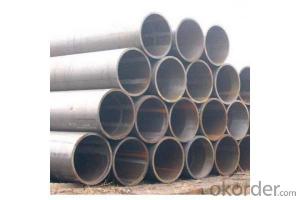LSAW SSAW CARBON STEEL PIPE ASTM API 32-36-38''
- Loading Port:
- Tianjin
- Payment Terms:
- TT OR LC
- Min Order Qty:
- 1 m.t.
- Supply Capability:
- 3000 m.t./month
OKorder Service Pledge
OKorder Financial Service
You Might Also Like
Packaging & Delivery
Packaging Detail: | Normal exporting packing,in container or bulk vessel or as per clients' request |
Delivery Detail: | 2 months after confimed contract |
Specifications
Large Diameter API 5L X70 PSL2 LSAW Steel Pipe
Grade: X42, X46, X50, X52, X60, B, C
OD: 1.5"-28"
WT: SCH10-SCH160
Large Diameter API 5L X70 PSL2 LSAW Steel Pipe
Specifications:
u Standard: API 5L
u Grade: B, C, X42, X46, X50, X52, X56, X60, X65, X70, X80
u OD: 1.5"-28"
u WT: SCH10-SCH160
u Length: 5-12m
u Ends Finish: plain end, bevel end, grooved end
u Surface Treatment: bare, black varnished, oiled finish, red color, anti-corrosion, 3PE, FBE or epoxy coating
u Technique: hot rolled or cold drawn
u Application: api 5l steel pipe for conveying oil, water, gas
u Invoicing: based on theoretical weight or actual weight
u Payment Terms: L/C at sight, T/T or Western Union
u Trade Terms: FOB, CFR, CIF
u Certification: ABS manufacturing assessment, ABS design assessment, API 5CT, API 5L, DNV manufacturer certificate, ISO9001 quality management system certificate, ISO14001 environment management system certificate, GB/T28001 occupational health and safety management system certificate, A1 class manufacturing license of special equipment certificate, CCS, GL, LR, SGS, TüV, PDE
- Q: How do steel pipes perform in high-altitude applications?
- Steel pipes perform well in high-altitude applications due to their strong structural integrity and resistance to extreme weather conditions. They can withstand the low temperatures and high winds commonly found at high altitudes without compromising their performance or durability. Additionally, steel pipes have excellent corrosion resistance, making them suitable for areas with high humidity or exposure to moisture. Overall, steel pipes are a reliable choice for high-altitude applications due to their strength, resilience, and ability to withstand harsh environmental factors.
- Q: What is the impact of steel pipe size on flow rate and pressure?
- The size or diameter of a steel pipe has a significant impact on both flow rate and pressure. Firstly, the flow rate refers to the volume of fluid that can pass through the pipe per unit of time. A larger pipe diameter allows for a greater flow rate as there is more space for the fluid to move through. This is due to the fact that a larger cross-sectional area of the pipe offers less resistance to the flow of fluid. Therefore, increasing the size of the steel pipe will generally lead to an increase in flow rate. Secondly, the pressure within a pipe is influenced by its size. As the fluid flows through a pipe, it encounters resistance due to friction against the walls of the pipe. This resistance leads to a pressure drop along the length of the pipe. A smaller pipe diameter results in higher frictional losses, which leads to a greater pressure drop. On the other hand, a larger pipe diameter reduces frictional losses and therefore results in a lower pressure drop. Consequently, increasing the size of the steel pipe will generally lead to a decrease in pressure drop. It is important to note that while increasing the size of a steel pipe may generally result in a higher flow rate and lower pressure drop, there are other factors that can also affect these parameters. These include the fluid properties, the length and layout of the pipe, and any additional components such as valves or fittings. Therefore, it is crucial to consider all these factors and conduct proper calculations or simulations to accurately determine the impact of steel pipe size on flow rate and pressure in a specific system.
- Q: How are steel pipes used in the manufacturing of pressure vessels?
- Steel pipes are commonly used in the manufacturing of pressure vessels due to their high strength and ability to withstand high pressure. These pipes are utilized as the primary material for constructing the shell of the pressure vessel, providing a robust and reliable structure. Additionally, steel pipes offer excellent resistance to corrosion, making them suitable for various industries and applications where pressure vessels are required, such as oil and gas, chemical processing, and power generation.
- Q: How do steel pipes handle extreme weather conditions?
- Steel pipes are highly durable and can withstand extreme weather conditions. They have excellent resistance to corrosion, making them suitable for humid and coastal areas. Additionally, steel pipes can withstand high temperatures, making them reliable in extreme heat or cold. Their strength and resilience make them ideal for various applications, including oil and gas pipelines, water supply systems, and construction projects in harsh weather environments.
- Q: What is an electric welded pipe (EFW)? Seek help!
- Pipe and pipe fittings should be suitable for the gap, usually with micro force insertion is appropriate, the gap is too large or too small will affect the quality of the interface.Check the depth of the plug and slip the spigot into the socket and position correctly.
- Q: What are the different types of joints used to connect steel pipes?
- There are several types of joints commonly used to connect steel pipes, including threaded joints, welded joints, flanged joints, and grooved joints.
- Q: Can steel pipes be used for underground oil and gas pipelines?
- Yes, steel pipes can be used for underground oil and gas pipelines. Steel is a commonly used material for such pipelines due to its strength, durability, and ability to withstand high pressure and extreme temperatures. Additionally, steel pipes can be coated or lined with corrosion-resistant materials to protect them from the corrosive properties of oil and gas.
- Q: Are steel pipes suitable for transporting gas?
- Yes, steel pipes are suitable for transporting gas. Steel pipes are known for their durability, strength, and resistance to corrosion, making them a reliable choice for transporting various types of gases, including natural gas, oil, and other flammable substances. Additionally, steel pipes can handle high pressure and temperature conditions, ensuring the safe and efficient transportation of gas over long distances.
- Q: Can steel pipes be used for fencing or railing?
- Yes, steel pipes can definitely be used for fencing or railing purposes. Steel pipes are known for their durability, strength, and resistance to corrosion, making them a popular choice for construction projects like fencing and railings. They provide a sturdy and long-lasting solution for securing properties or creating barriers, while also offering an aesthetically pleasing and modern look.
- Q: What is the difference between steel pipes and fiberglass-reinforced pipes?
- The main difference between steel pipes and fiberglass-reinforced pipes lies in their composition and structural properties. Steel pipes are made primarily of iron and carbon, which provide high strength and durability. On the other hand, fiberglass-reinforced pipes consist of a composite material that combines a resin matrix with glass fibers, offering excellent corrosion resistance and high tensile strength. Additionally, steel pipes are heavier and require more maintenance, while fiberglass-reinforced pipes are lighter, easier to install, and have a longer lifespan.
Send your message to us
LSAW SSAW CARBON STEEL PIPE ASTM API 32-36-38''
- Loading Port:
- Tianjin
- Payment Terms:
- TT OR LC
- Min Order Qty:
- 1 m.t.
- Supply Capability:
- 3000 m.t./month
OKorder Service Pledge
OKorder Financial Service
Similar products
Hot products
Hot Searches
Related keywords
